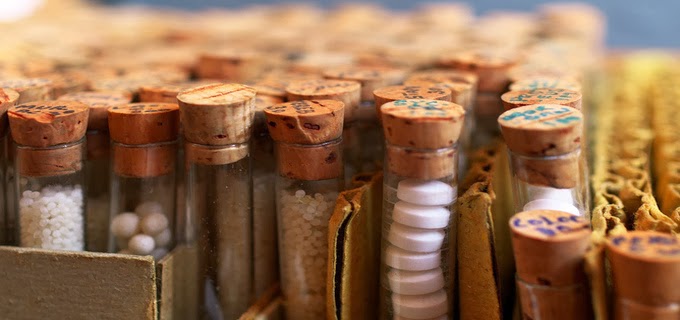Cyclamen Europaeum is prepared from the root of a plant
famous for the bizarre stories surrounding it. Cyclamen is the remedy full of conflicting qualities. Its
patient does not want to move at all, even though movement relieves his symptoms.
The patient is afraid of going into the open although the open air relieves his
symptoms, especially those of cold and cough.
His desire not to move or walk around is based on the weakness of his body.
Associated with this remedy are the symptoms of severe diarrhoea and vomiting, severe stomach upset, and a salty
taste in the mouth. In women, the menstruation becomes irregular. Periods become more frequent,
copious in amount and the blood is black and clotted.
With movement, the bleeding becomes less. All these are signs of Cyclamen.
Cyclamen is very important in the treatment of progressive anaemia resulting
from excessive menstrual bleeding. Both
sexes can have various kinds of disorders of the urinary system and of sexual
weakness.The Cyclamen patient is very restless at night. He feels weak on walking,
although, walking relieves his aches and pains to some extent.
In a patient of Cyclamen, the mental state fluctuates. Out of sudden happiness,
he may become delirious or then feel tired and down. His mind is empty. He does
not even want to speak. He is irritable and hates to do anything. A female Cyclamen patient feels lonely and presumes that
everybody is talking ill of her. A number of young girls have the same feeling.
I have tried Sulphur and Stramonium to treat such girls, but did not find any
obvious beneficial effects. Perhaps, Cyclamen could have been useful. In Cyclamen, the headache
is very severe. It feels as if the head is going to explode. It starts in the morning. The patient sees
stars before the eyes. The eyesight becomes blurred. A peculiar
type of eye
squint, in which the eyeballs turn inwards, is very amenable to treatment with Cyclamen.
The eyes feel warm. There is double vision (diplopia).
At times, the eye conditions can be secondary to the stomach upset. The pupils become dilated. Half of the field
of vision is lost (hemianopia) and spots of different colours appear
before the eyes In Cyclamen the right
ear hurts, feeling drawn in. Thundering noises are heard in the ears
so the hearing is also affected. In
Cyclamen, there is a feeling of burning,
dryness and scraping in the throat. The patient does not usually
feel thirsty, but during a fever, especially in the evening, he feels very
thirsty. The stomach symptoms of Cyclamen are comparable
to those of Pulsatilla. The patient hates fatty food. His stomach feels hot and
burns and is much worse after drinking coffee. A typical symptom of Cyclamen is
that every time the patient drinks coffee, he will have diarrhoea. The
hiccuping associated with stomach upset is also a characteristic of Cyclamen.
Cyclamen is similar to Gelsemium regarding the feeling of the dryness of the
mouth, lack of thirst and excessive
urination. Usually, the patient also sweats much less, however,
while sick, he sweats a lot. The quantity
of the urine is much increased. The urine is colourless like water
and passed frequently.
The phlegm
in a patient of Cyclamen is whitish.
It means that the invasion by the bacteria has not been severe and the obvious
infection has not been established. In Cyclamen, the patient
experiences a suffocating cough. The superficial bones hurt. There is severe cramping of the right thumb and
the index finger, which becomes worse on writing. The heel of the foot throbs like an abscess. Sometimes this kind of pain may be associated with the formation of bone spurs which
need needing prolonged treatment as a result of which, the excessive outgrowth
of the bone may stop. Once these spurs develop to a significant size, surgery
is indicated. The remedies implied to relieve this kind of heel pain are
Arnica, Ledum, Ruta, Calcarea Flour, Rhus Tox, as well as Calcarea Carb.In Cyclamen, scratching relieves the itching. The
itchiness (pruritis) is relieved at the onset of menstruation.





